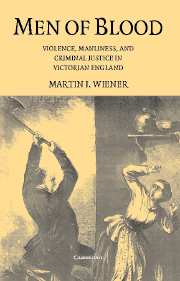Crossref Citations
This Book has been
cited by the following publications. This list is generated based on data provided by Crossref.
Gottschalk, Marie
2001.
The Prison and the Gallows.
Wiener, Martin J.
2004.
Murder & the Modern British Historian.
Albion,
Vol. 36,
Issue. 1,
p.
1.
Grafe, Adrian
2004.
‘What I have done Violent’: Hopkins and Violence.
Cahiers victoriens et édouardiens,
Vol. 60 Automne,
Issue. ,
Emsley, Clive
2005.
Crime and Punishment: 10 years of research (1).
Crime, Histoire & Sociétés,
Vol. 9,
Issue. 1,
p.
117.
Foyster, Elizabeth
2005.
Marital Violence.
Anderson, Jack
2006.
Violence and Crime in Nineteenth Century England: The Shadow of our Refinement. By J. Carter Wood (London: Routledge, 2004, xii + 204pp. £80.00 hb).
The British Journal of Criminology,
Vol. 46,
Issue. 2,
p.
375.
Wood, J. Carter
2006.
Criminal Violence in Modern Britain.
History Compass,
Vol. 4,
Issue. 1,
p.
77.
Ramsey, Carolyn B.
2006.
Public Responses to Intimate Violence: A Glance at the Past.
Public Health Reports®,
Vol. 121,
Issue. 4,
p.
460.
Davies, Andrew
2006.
Youth, violence, and courtship in late-Victorian Birmingham: The case of James Harper and Emily Pimm.
The History of the Family,
Vol. 11,
Issue. 2,
p.
107.
Emsley, Clive
2006.
Fair fights and cut-throats.
Criminal Justice Matters,
Vol. 65,
Issue. 1,
p.
8.
Broughton, Trev Lynn
and
Rogers, Helen
2007.
Gender and Fatherhood in the Nineteenth Century.
p.
1.
Smith, Bruce P.
2007.
English Criminal Justice Administration, 1650–1850: A Historiographic Essay.
Law and History Review,
Vol. 25,
Issue. 3,
p.
593.
Wood, John Carter
2007.
Cultures of Violence.
p.
79.
Wiener, Martin J.
2007.
Cultures of Violence.
p.
236.
Arnot, Margaret L.
2007.
Essay Review: Hilary Marland. Dangerous Motherhood: Insanity and Childbirth in Victorian Britain. Basingstoke and New York: Palgrave Macmillan, 2004. Pp. xii + 304. £52.50. ISBN 1403920389.
History of Psychiatry,
Vol. 18,
Issue. 4,
p.
503.
Logan, Anne
2008.
Feminism and Criminal Justice.
p.
1.
Banks, Stephen
2008.
Killing with Courtesy: The English Duelist, 1785–1845.
Journal of British Studies,
Vol. 47,
Issue. 3,
p.
528.
Linders, Annulla
and
Van Gundy-Yoder, Alana
2008.
Gall, Gallantry, and the Gallows.
Gender & Society,
Vol. 22,
Issue. 3,
p.
324.
Williams, Chris A.
2008.
Ideologies, structures, and contingencies: writing the history of British criminal justice since 1975.
Revue française de civilisation britannique,
Vol. XIV,
Issue. 4,
Deluermoz, Quentin
2008.
Quelques échelles de la violence.
Déviance et Société,
Vol. Vol. 32,
Issue. 1,
p.
75.



